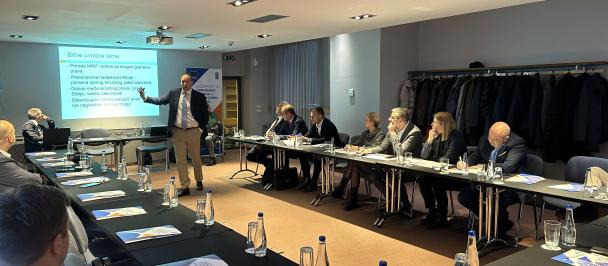News source: Balkan Insight
Training course on war crime trials reporting
Belgrade, 16 October 2019 - The three-day training course on war crime trials reporting, organised by Balkan Investigative Reporting Network, (BIRN) in cooperation with the United Nations Development Programme (UNDP), was held in Belgrade.
A total of 25 reporters from various countries and territories across the former Yugoslavia were trained by journalists with substantial experience in covering war crimes trials and transitional justice topics. Participants also heard from experts who are directly involved in legal processes, such as prosecutors and court officials.
As well as looking at the essentials of criminal procedures, best practices for reporting on cases and sources of information for journalists, the course also focused on the role that victims play in war crimes trial processes.
BIRN’s regional director Marija Ristic said that the idea of the training course was to look beyond the proceedings in war crime trials and use the archives that courts have built up and the legacy of their judgments as story material.
“This job is very rewarding because we are giving a voice to the victims and sometimes, if it was not for us, their stories would never be told,” Ristic said.
The project is being supported by the United Kingdom’s embassy in Belgrade and the European Commission.
UK embassy First Secretary Chantel Care said that it is important for journalists to strengthen their networks and partnerships.
UNDP Resident Representative in Serbia, Francine Pickup, pointed out that there are still hundreds of war crimes cases to be prosecuted in the region and said that the training could help journalists address challenges they might face while reporting on the proceedings.
“Accountability for war crimes is fundamental to good neighbourly relations and long-term stability in the Western Balkans, while professional media reporting is indispensable for the public to understand the importance of war crimes trials.” Pickup said.
Expert panellists at the course included Nemanja Stjepanovic from the International Residual Mechanism for Criminal Tribunals Registry, Bosnia and Herzegovina’s state prosecution spokesperson Boris Grubesic, Croatian Chief State Attorney’s Office spokesperson Martina Mihordin, and Vasilije Saratlic, deputy war crimes prosecutor and spokesperson at Serbia’s War Crimes Prosecutor’s Office.
After the course, the participants were required to pitch an in-depth story about transitional justice issues in the Balkans. The journalists who propose the best stories will receive a grant of 1,000 euros from BIRN to further develop their work in cooperation with BIRN’s experienced pool of editors.
From the pitches and general assessments of the participants during the course, BIRN will select ten journalists to participate in a study visit to The Hague that will be held in November 2019.
The training is a part of Regional War Crimes (RWC) project implemented by the UNDP Istanbul Regional Hub (IRH) in collaboration with the UNDP Country Offices BiH, Montenegro and Serbia, and supported by the British Embassy in Serbia. The Project aims to increase the efficiency and success of war crimes prosecution, mainly through support to regional co-operation of prosecutors, but also to improve public information in the region about war crimes trials. The partner in organising and delivering the training is the Balkan Investigative Reporting Network (BIRN).

 Locations
Locations




